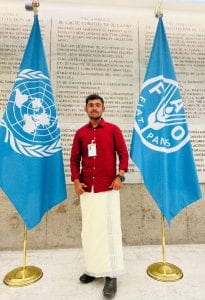Afsal Ayoob Khan, participated in the “Global Youth Dialogue on Sustainable Livestock Transformation” organized by the Food and Agriculture Organization of the United Nations in September 2023. Here is his account of the experience.
 Participating in the dynamic Global Youth Dialogue on Sustainable Livestock Transformation at the Food and Agricultural Organization of the United Nations in Rome, Italy, was a great learning experience that has instilled in me a profound sense of responsibility towards sustainable livestock production and also motivated me to continue my work with renewed vigor and dedication. As a young participant deeply engaged in the livestock sector, this event was a pivotal moment in my journey towards advocating for a sustainable future. Together with fellow young leaders from diverse backgrounds, we embarked on a mission to reshape and rejuvenate livestock systems worldwide, driven by the urgency of global challenges and the ambition to leave a lasting legacy. Our shared vision, articulated through passionate discussions, healthy arguments and collaborative thinking, focuses on the transformation of the livestock sector into a realm where sustainability, economic viability, and social equity converge. Embracing the One Health approach, we recognize the interconnected health of people, animals, and ecosystems as foundational to our aspirations.
Participating in the dynamic Global Youth Dialogue on Sustainable Livestock Transformation at the Food and Agricultural Organization of the United Nations in Rome, Italy, was a great learning experience that has instilled in me a profound sense of responsibility towards sustainable livestock production and also motivated me to continue my work with renewed vigor and dedication. As a young participant deeply engaged in the livestock sector, this event was a pivotal moment in my journey towards advocating for a sustainable future. Together with fellow young leaders from diverse backgrounds, we embarked on a mission to reshape and rejuvenate livestock systems worldwide, driven by the urgency of global challenges and the ambition to leave a lasting legacy. Our shared vision, articulated through passionate discussions, healthy arguments and collaborative thinking, focuses on the transformation of the livestock sector into a realm where sustainability, economic viability, and social equity converge. Embracing the One Health approach, we recognize the interconnected health of people, animals, and ecosystems as foundational to our aspirations.
In addition, we underscore the importance of preserving indigenous and pastoralist knowledge, advocating for enhanced education and vocational training to equip youth with the skills needed for innovation. Environmentally, we urge action against climate change impacts and the promotion of climate-smart practices tailored to various livestock production systems. As a committed researcher, I pledge to work towards sustainable livestock transformation. In addition, through my research project, I learned how youth-led scientific initiatives can play a pivotal role in shaping a more sustainable future. My research, mainly focusing on developing interventions to reduce enteric methane emissions from the early life stages of cattle, represents a critical step forward in the quest for sustainable livestock production. This innovative research directly contributes to global efforts aimed at mitigating climate change by addressing one of the significant sources of greenhouse gas emissions in the livestock sector. Overall, this experience has not only enriched my understanding but also amplified my voice in the global dialogue, instilling a responsibility to care for our sector and natural resources for generations to come.
